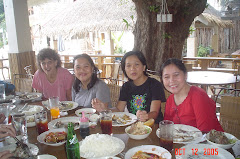I attended an organization's GA yesterday. It was attended by about 36 active members and about 10 applicants. One of the agenda was to hear and vote on a case of sexual harassment. I was there together with another staff from another UP unit. The president presided the meeting. Then, he started with:"the EB decided that this case does not constitute sexual harassment". The whole GA was supposed to have read the case via e-group. And then the votation went on: "those who are in favor of the GA's resolution, raised their hands and those who want to abstain can abstain in the assumption that they have not read the case" (6 abstained, all men and mostly matured looking). The decision of the EB was upheld. Some protested for the 'reprimand' proposal, they went for a higher penalty which was suspension. The member argued: "we had a case of violation of the 'leave no trace' pithaya principle and he was expelled, why can't we expel this one". Another said:"There was also a case of 'eating guavas' and that member too met a stiff penalty". A woman member was still asking "has this been proven (SH)?"What infuriated me was the reiteration of the president "the EB decided that this does not constitute a case of sexual harassment." Why can't they name it SH?
Earlier before the meeting, we talked with their EB-lawyer. She said the three elements of SH must be fulfilled before it can be regarded as an SH case. Then, she remarked that perpetrator was not anymore under the jurisdiction of the law because he is already an alumni. We insisted that the case fell under number 3 element (the victim's feelings of being humiliated, etc.) and it was an "or" clause, not. She said having interviewed other members who were present during the applicants' party, only the version of the complainant was 'unique'. She said, the complainant narrated she was boxed in by the harasser. But based on the others' testimonies, the man was sitting beside the girl. Later, we learned from the EB, that the girl even hugged the man prior to the SH incident.
I told them the continuum of abuse in any sexual harassment case must be looked it. Yes, it was true the girl hugged the man prior to the SH because it was a friendly gesture and she did not feel anything wrong about that. Perhaps, it showed that she was not thinking of anything ill about the man. That gesture must be appreciated. But when did she feel sexually harassed? It was when the man mashed her breasts and her back. She was resisting mentally during taht time but cannot react because she was still feeling her way (as one can see she hugged the man earlier but did not feel any violation, but at this point she felt there was something wrong but cannot yet name it). So,when somebody asked her 'binabastos ka ba'? She even said, "matagal na" (perhps with reference to the text messages he sent him way back when). This question affirmed her initial feelings. This somebody who pinned down the man on the wall allowed her to name her feelings (the EB said she was ranting afterwards).
Yes, the organization was surely right in pinpointing that aggressive act of 'pinning down' another person on the wall was a violation of the 'pithaya' principle. But did they not see the act of the man (SH) prior to the aggressive reaction of another man? The EB told me,"meron na pong galit yung isang lalaki dun sa isang lalaki" (the two had an initial conflict).
The feelings of the girl were resistance on her part. It was clearly voiced out through the help of another man (the one who pinned down the harasser) . All of the parties in the complaint were inebriated at some levels. But this state of body/mind also helped the girl to be more in tuned with her feelings (in a way allowed her not to be inhibited). The harasser was also under that state of intoxication and perhaps he too was 'aroused' (in that inebriated state). (Perhaps...) But all those psychological states need not intervene to let us see (outsiders looking in) that the mashing of the breasts and face-to-face talking with the girl constitute acts of sexual harassment (added to that the earlier versions of text messages amounting to verbal sexual harassment---e.g. "sana next time na malasing tayo ay mangyaring 'kababalaghan'; and "nakahawak ka na ba ng 'balls'). Nobody can attest to the acts; no one had uttered they had seen it; only the girl testified for her part of the truth.
I was there to appreciate the organization's process. But I realized an 'impartial' body is needed to see the case for what truly it is. The culture of 'a party' clearly allowed those 'friendly banters' and 'inappropriate acts' to happen. It so happened that a girl was harmed psychologically and emotionally (abuse of personal space). If the organization truly upholds the pithaya principles, perhaps they can see that the 'the essential is not always visible to the eyes'. The aggressiveness is a very visible thing to look at as violation of another's space. But SH is more of psychological transgression that only a victim can sufficedly identify.
I hope justice will illumine the organization and that the girl's aspirations to become a mountain lover will not be compromised nor undermined because the girl was braved enough to stand her ground (the harasser was not present during the GA).
Sunday, October 5, 2008
Subscribe to:
Post Comments (Atom)





No comments:
Post a Comment